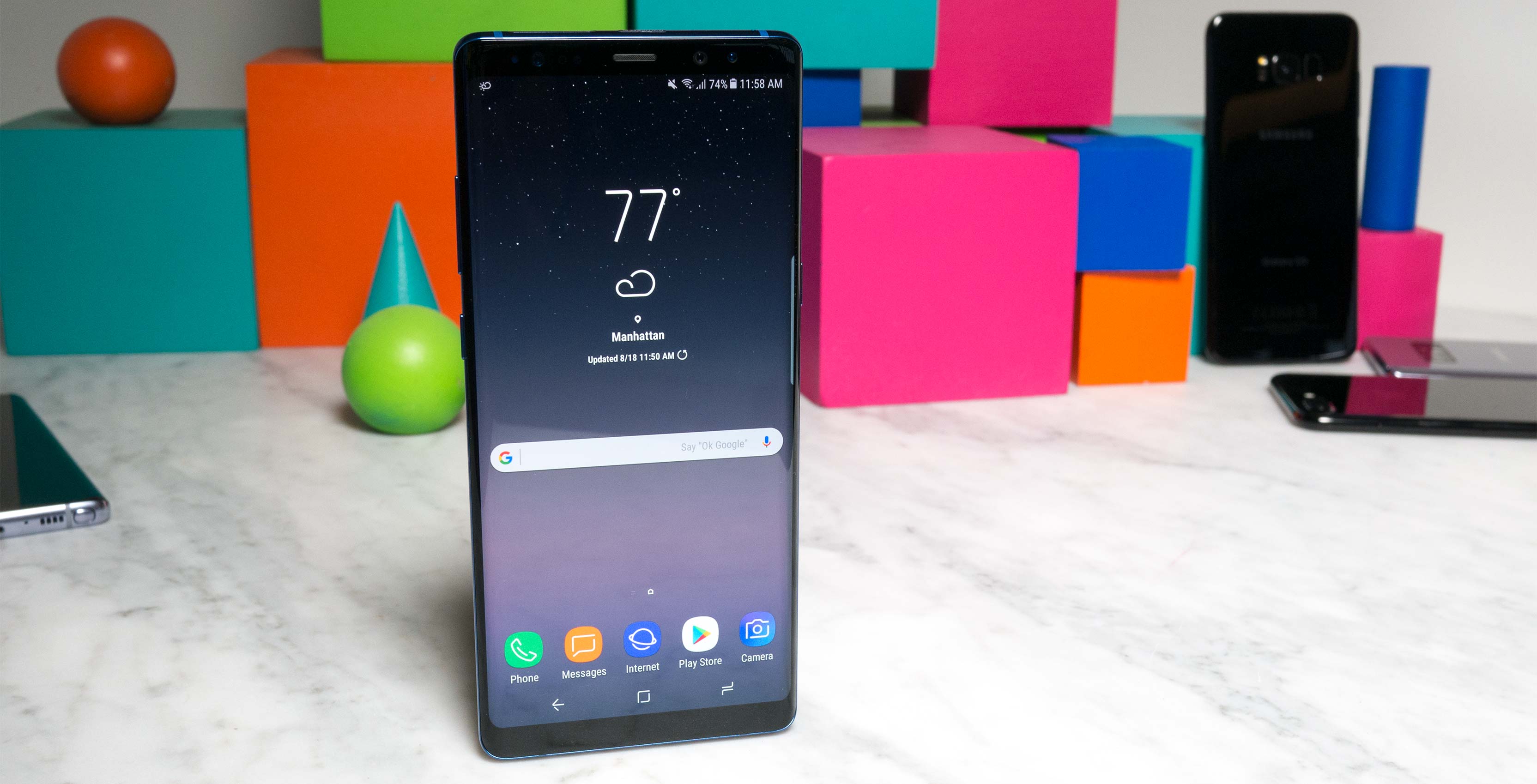
My initial impression of Samsung’s Galaxy Note 8 is that the phone, both internally and externally, bears a striking resemblance to its fire-prone predecessor, the Note 7.
Given that Samsung’s last ill-fated entry in the Note line remains one of my favourite smartphones of all time, I don’t necessarily consider this a bad thing.
Those who were hoping for a substantial overhaul of the Note series, however, may be disappointed with the tech giant’s latest stylus-equipped phablet.
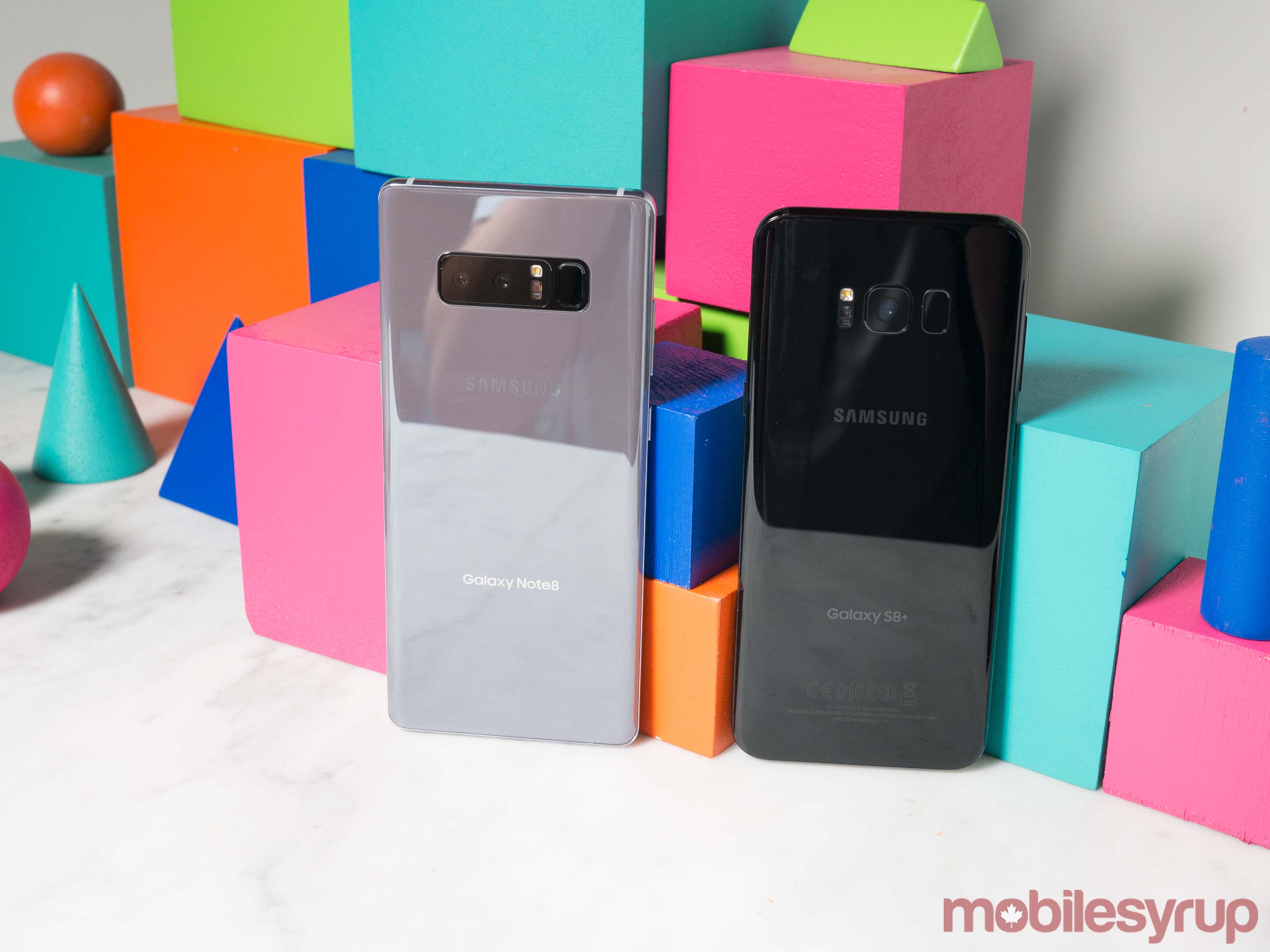
Samsung has a lot riding on the Note 8’s release. The company essentially defined the phablet category with the release of the original Note back in 2011, then perfected it with the Note 7 roughly five years later. The South Korean company’s bout of positive press surrounding the Note 7 was short-lived though, as two consecutive recalls embroiled the tech giant in a furor of controversy even the most clairvoyant of industry experts could not have predicted.
That said, Samsung is well aware that if any of its future devices, especially those from the Note brand, experience overheating issues again, the company’s reputation in the competitive Android smartphone industry will suffer irreparable damage.
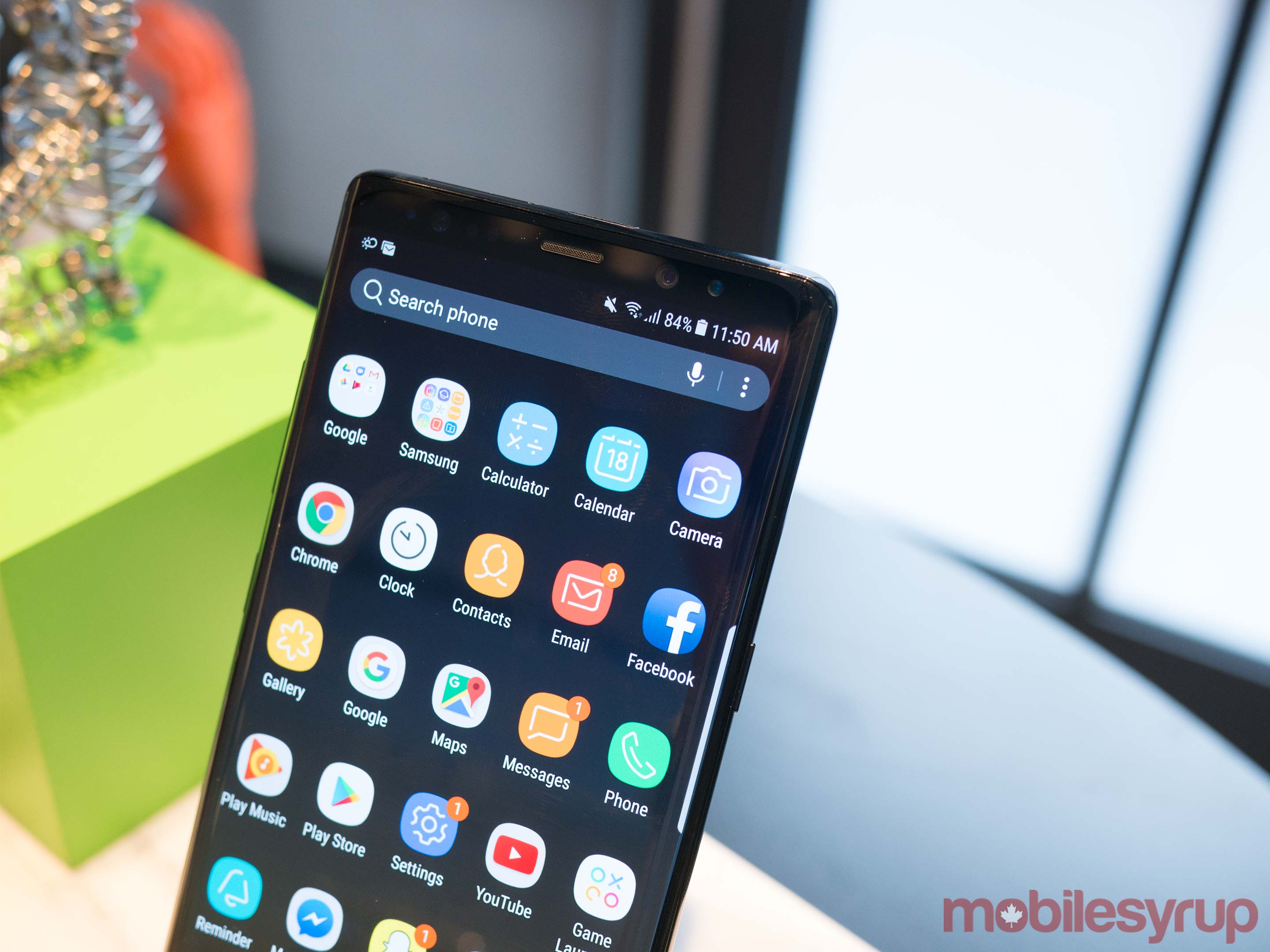
To Samsung’s credit, it now has an eight-point battery check system in place to ensure each power source is of the utmost quality. In the case of the case of the Note 8 specifically, the manufacturing giant has enlisted the help of an outside a quality assurance agency.
So while there’s no way to predict if the Note 8 will catch fire like its predecessor, the possibility of that happening again is highly unlikely; Samsung knows what is at stake here.
Samsung Galaxy Note 8
Samsung Galaxy Note 7
Samsung Galaxy S8+
Samsung Galaxy S8
Display
6.3-inch, Super AMOLED display, 1440 x 2960 pixels, 18:5:9 aspect ratio, HDR 10
5.7-inch Super AMOLED capacitive touchscreen, 1440 x 2560 pixels
6.2-inch Super AMOLED display, 18.5:9 aspect ratio
5.8-inch Super AMOLED display, 18.5:9 aspect ratio
Processor
Snapdragon 835 (Exynos 8895)
Quad-core 64-bit (2.15GHz dual + 1.6GHz dual) Qualcomm Snapdragon 820
Snapdragon 835 (Exynos 8895 in Europe and other regions)
Snapdragon 835 (Exynos 8895 in Europe and other regions)
RAM
6GB RAM
4GB RAM
4GB of RAM
4GB of RAM
Storage
64GB (expandable up to 256GB)
64GB
64GB (expandable up to 256GB)
64GB (expandable up to 256GB)
Dimensions (in.)
162.5mm x 74.6mm x 8.5mm
153.5mm x 73.9mm x 7.9mm
159.5 x 73.4 x 8.1mm
148.9 x 68.1 x 8.0mm
Weight
195g
169 g
173g
152g
Rear Facing Camera
12-megapixel (f/1.7) + 12-megapixel (f.2.4, OIS, AF) dual-LED flash
12-megapixel f/1.7 camera with OIS (optical image stabilization), 4K video
12-megapixel (f/1.7, OIS)
12-megapixel (f/1.7, OIS)
Front Facing Camera
8-Megapixel (f/1.7)
5-megapixel camera
8-megapixel (f/1.7)
8-megapixel (f/1.7)
OS
Android 7.1 Nougat
Android 6.0.1 Marshmallow
Android 7.0 Oreo
Android 8.0 Oreo
Battery
3,300mAh
Non-removable Li-Ion 3500 mAh battery
3,500 mAh
3,000 mAh
Network Connectivity
GSM / HSPA / LTE
GSM/HSPA/LTE, WiFi 802.11 a/b/g/n/ac (2.4/5GHz), MIMO (2×2) 620Mbps, NFC, Bluetooth v 4.2 LE, ANT+
GSM/HSPA/LTE
GSM/HSPA/LTE
Sensors
Iris scanner, fingerprint (rear-mounted), accelerometer, gyro, proximity, compass, barometer, heart rate, SpO2
Barometer, Fingerprint Sensor, Gyro Sensor, Geomagnetic Sensor, Hall Sensor, HR Sensor, Iris Sensor, Proximity Sensor, RGB Light Sensor
Accelerometer, Barometer, Fingerprint Sensor, Gyro Sensor, Geomagnetic Sensor, Hall Sensor, Heart Rate Sensor, Proximity Sensor, RGB Light Sensor, Iris Sensor, Pressure Sensor
Accelerometer, Barometer, Fingerprint Sensor, Gyro Sensor, Geomagnetic Sensor, Hall Sensor, Heart Rate Sensor, Proximity Sensor, RGB Light Sensor, Iris Sensor, Pressure Sensor
SIM Type
Nano SIM
Nano SIM
Nano SIM
Nano SIM
Launch Date
August 23, 2017
August 19, 2016
March 29, 2017
March 29, 2017
Misc
Colours: Black, Blue | IP68 water/dust resistant, S-Pen, 18:9 aspect ratio, wireless charging, USB type C
Recalled on October 10th, 2016
Colours: Black, Orchid Gray, Silver, Gold and Blue| Bixby, IP68 water and dust resistance, 3.5mm headphone jack, USB Type-C.
Colours: Midnight Black, Orchid Gray, Arctic Silver, Coral Blue and Maple Gold| Bixby, IP68 certified water-resistant, 3.5mm headphone jack, USB Type-C.
Display
Samsung Galaxy Note 8
6.3-inch, Super AMOLED display, 1440 x 2960 pixels, 18:5:9 aspect ratio, HDR 10
Samsung Galaxy Note 7
5.7-inch Super AMOLED capacitive touchscreen, 1440 x 2560 pixels
Samsung Galaxy S8+
6.2-inch Super AMOLED display, 18.5:9 aspect ratio
Samsung Galaxy S8
5.8-inch Super AMOLED display, 18.5:9 aspect ratio
Processor
Samsung Galaxy Note 8
Snapdragon 835 (Exynos 8895)
Samsung Galaxy Note 7
Quad-core 64-bit (2.15GHz dual + 1.6GHz dual) Qualcomm Snapdragon 820
Samsung Galaxy S8+
Snapdragon 835 (Exynos 8895 in Europe and other regions)
Samsung Galaxy S8
Snapdragon 835 (Exynos 8895 in Europe and other regions)
RAM
Samsung Galaxy Note 8
6GB RAM
Samsung Galaxy Note 7
4GB RAM
Samsung Galaxy S8+
4GB of RAM
Samsung Galaxy S8
4GB of RAM
Storage
Samsung Galaxy Note 8
64GB (expandable up to 256GB)
Samsung Galaxy Note 7
64GB
Samsung Galaxy S8+
64GB (expandable up to 256GB)
Samsung Galaxy S8
64GB (expandable up to 256GB)
Dimensions (in.)
Samsung Galaxy Note 8
162.5mm x 74.6mm x 8.5mm
Samsung Galaxy Note 7
153.5mm x 73.9mm x 7.9mm
Samsung Galaxy S8+
159.5 x 73.4 x 8.1mm
Samsung Galaxy S8
148.9 x 68.1 x 8.0mm
Weight
Samsung Galaxy Note 8
195g
Samsung Galaxy Note 7
169 g
Samsung Galaxy S8+
173g
Samsung Galaxy S8
152g
Rear Facing Camera
Samsung Galaxy Note 8
12-megapixel (f/1.7) + 12-megapixel (f.2.4, OIS, AF) dual-LED flash
Samsung Galaxy Note 7
12-megapixel f/1.7 camera with OIS (optical image stabilization), 4K video
Samsung Galaxy S8+
12-megapixel (f/1.7, OIS)
Samsung Galaxy S8
12-megapixel (f/1.7, OIS)
Front Facing Camera
Samsung Galaxy Note 8
8-Megapixel (f/1.7)
Samsung Galaxy Note 7
5-megapixel camera
Samsung Galaxy S8+
8-megapixel (f/1.7)
Samsung Galaxy S8
8-megapixel (f/1.7)
OS
Samsung Galaxy Note 8
Android 7.1 Nougat
Samsung Galaxy Note 7
Android 6.0.1 Marshmallow
Samsung Galaxy S8+
Android 7.0 Oreo
Samsung Galaxy S8
Android 8.0 Oreo
Battery
Samsung Galaxy Note 8
3,300mAh
Samsung Galaxy Note 7
Non-removable Li-Ion 3500 mAh battery
Samsung Galaxy S8+
3,500 mAh
Samsung Galaxy S8
3,000 mAh
Network Connectivity
Samsung Galaxy Note 8
GSM / HSPA / LTE
Samsung Galaxy Note 7
GSM/HSPA/LTE, WiFi 802.11 a/b/g/n/ac (2.4/5GHz), MIMO (2×2) 620Mbps, NFC, Bluetooth v 4.2 LE, ANT+
Samsung Galaxy S8+
GSM/HSPA/LTE
Samsung Galaxy S8
GSM/HSPA/LTE
Sensors
Samsung Galaxy Note 8
Iris scanner, fingerprint (rear-mounted), accelerometer, gyro, proximity, compass, barometer, heart rate, SpO2
Samsung Galaxy Note 7
Barometer, Fingerprint Sensor, Gyro Sensor, Geomagnetic Sensor, Hall Sensor, HR Sensor, Iris Sensor, Proximity Sensor, RGB Light Sensor
Samsung Galaxy S8+
Accelerometer, Barometer, Fingerprint Sensor, Gyro Sensor, Geomagnetic Sensor, Hall Sensor, Heart Rate Sensor, Proximity Sensor, RGB Light Sensor, Iris Sensor, Pressure Sensor
Samsung Galaxy S8
Accelerometer, Barometer, Fingerprint Sensor, Gyro Sensor, Geomagnetic Sensor, Hall Sensor, Heart Rate Sensor, Proximity Sensor, RGB Light Sensor, Iris Sensor, Pressure Sensor
SIM Type
Samsung Galaxy Note 8
Nano SIM
Samsung Galaxy Note 7
Nano SIM
Samsung Galaxy S8+
Nano SIM
Samsung Galaxy S8
Nano SIM
Launch Date
Samsung Galaxy Note 8
August 23, 2017
Samsung Galaxy Note 7
August 19, 2016
Samsung Galaxy S8+
March 29, 2017
Samsung Galaxy S8
March 29, 2017
Misc
Samsung Galaxy Note 8
Colours: Black, Blue | IP68 water/dust resistant, S-Pen, 18:9 aspect ratio, wireless charging, USB type C
Samsung Galaxy Note 7
Recalled on October 10th, 2016
Samsung Galaxy S8+
Colours: Black, Orchid Gray, Silver, Gold and Blue| Bixby, IP68 water and dust resistance, 3.5mm headphone jack, USB Type-C.
Samsung Galaxy S8
Colours: Midnight Black, Orchid Gray, Arctic Silver, Coral Blue and Maple Gold| Bixby, IP68 certified water-resistant, 3.5mm headphone jack, USB Type-C.
The leaks are real
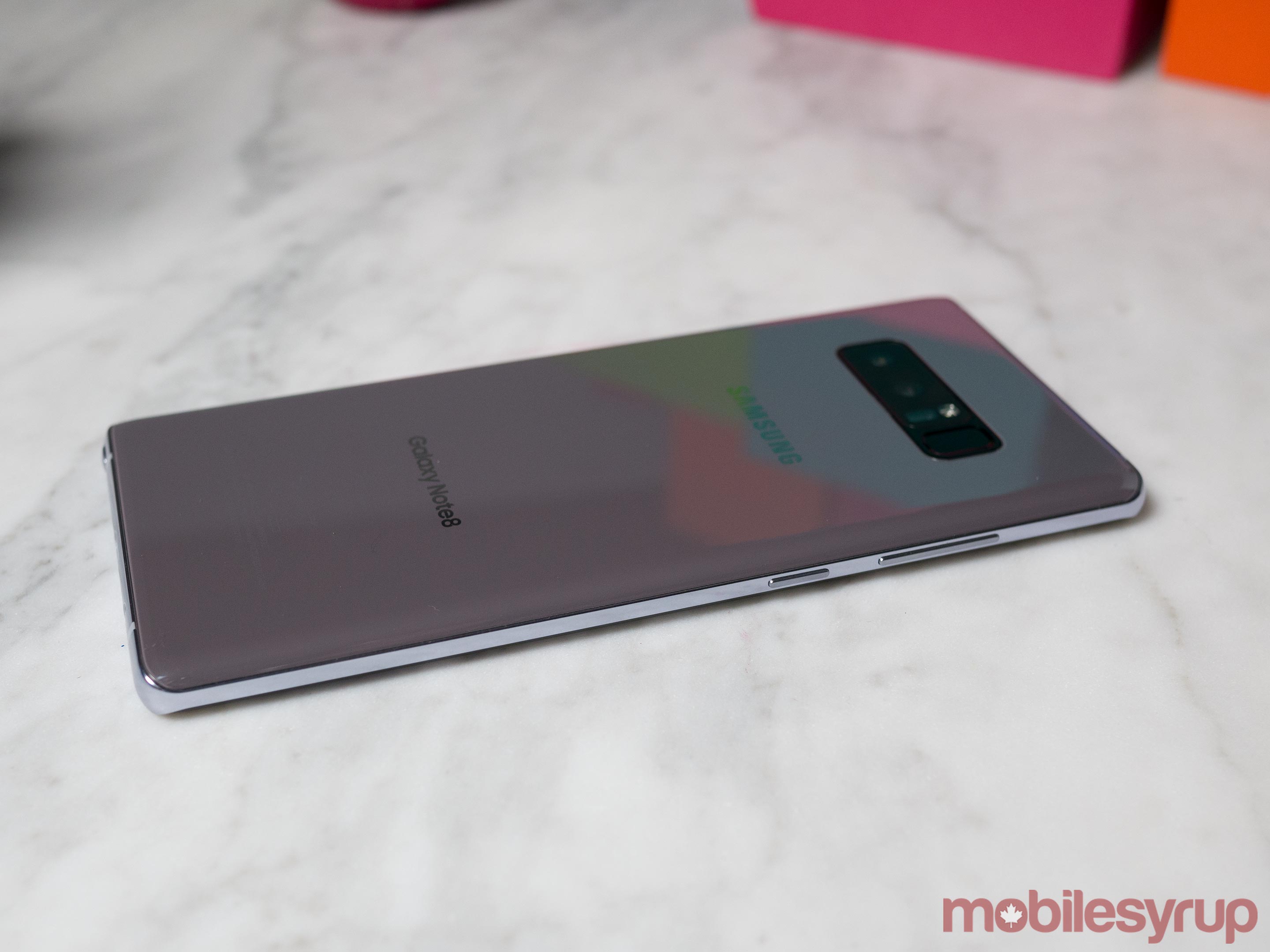
In general, the Note 8 looks like a slightly larger and boxier Galaxy S8 or S8+, including the removal of the physical home button. The device features a 6.3-inch quad HD Super AMOLED display that is just as great looking as the Galaxy S8 and S8+’s stellar screen, if not more so given the greater glass real-estate. It’s also worth pointing out that the Note 8’s display is also substantially larger than the Note 7’s 5.7-inch display — make no mistake, this is a big phone.
While I didn’t spend a significant amount of time with the Note 8, I tested a few 4K YouTube videos and they looked stunning. It’s also worth noting that the Note 8 features what Samsung calls Mobile HDR Premium, a mobile-focused HDR standard that isn’t Dolby Vision or HDR10, but offers comparable high dynamic range quality.
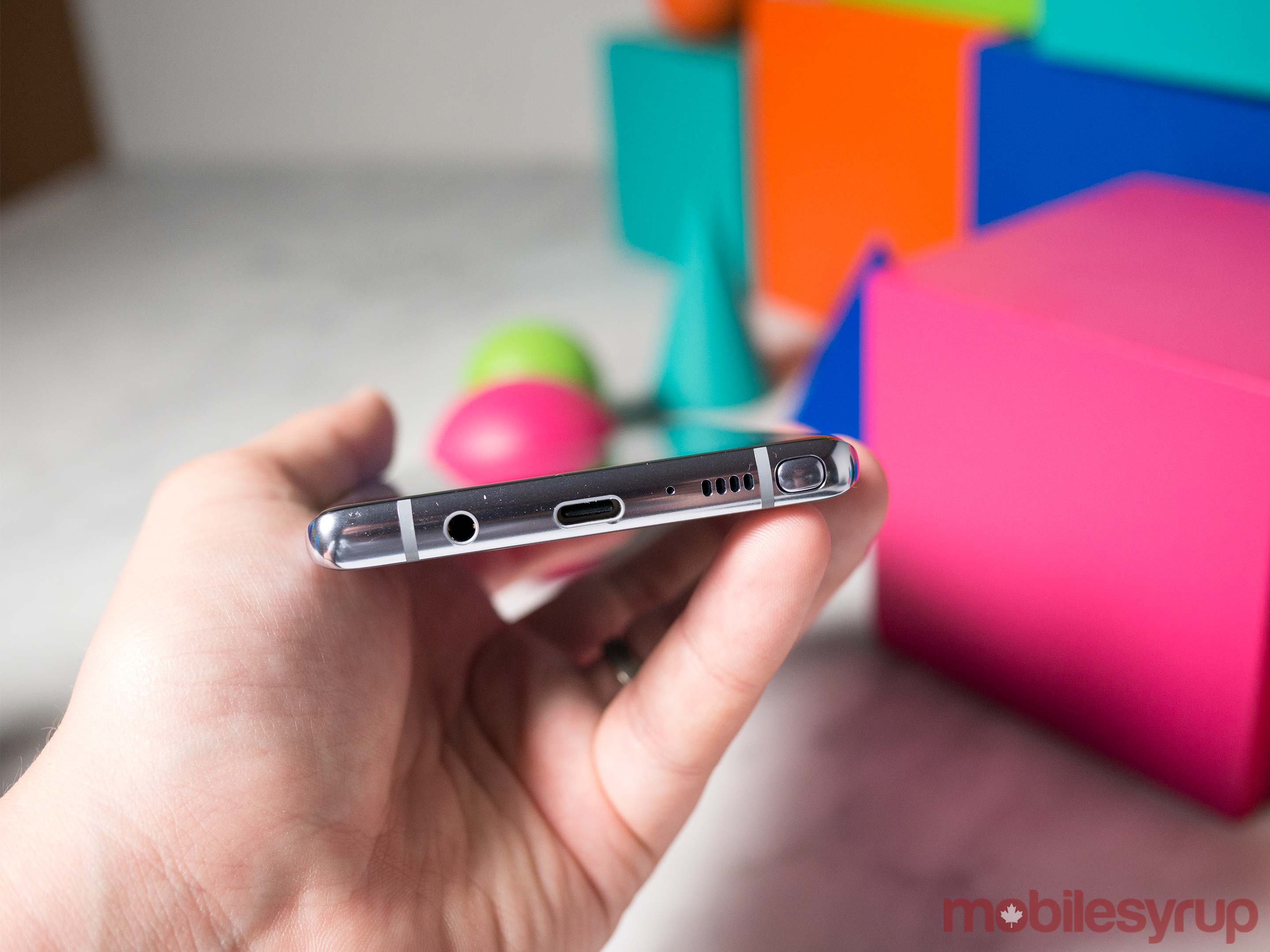
Given its 2960 x 1440 pixel resolution and unique 18:5:9 aspect ratio, the Note 8 doesn’t actually feel as large as it really is. The phone’s thin profile, just like the S8 and S8+, makes it easy to use with just one hand, though those with smaller hands may run into difficulty
“Samsung has a lot riding on the Note 8’s release”
Given the Note 8’s screen size surpasses the the S8+’s by 0.1 of an inch, it’s actually much easier to multi-task with the Note 8 when compared to Samsung’s other two flagship Galaxy devices. This benefit is compounded by a new split screen multi-tasking feature Samsung is calling ‘App Pair,’ which allows users to program two apps to launch simultaneously and then save the setting in the phone’s edge for easy access.
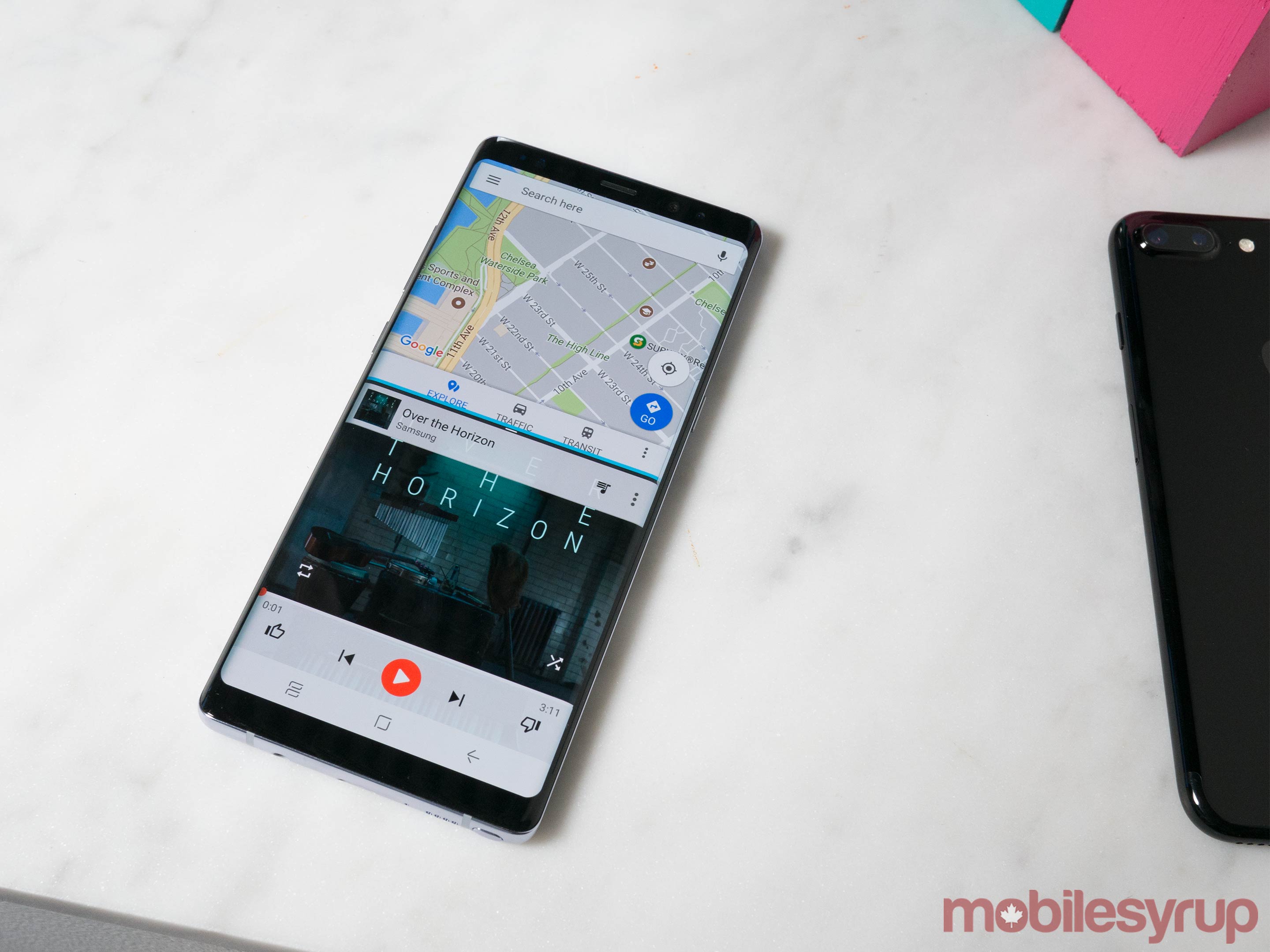
While far from revolutionary, for users that commonly open two apps simultaneously — email and a web browser, for example, or YouTube and a chat app — this feature could prove useful.
Other specs include 6GB of RAM, a Qualcomm Snapdragon 835 processor (yes, even in Canada) and 64GB of internal storage that’s expandable via a microSD card. Thankfully, the Note 8 still has an IP68 rating for water resistance as well, and features a 3.5mm headphone jack.
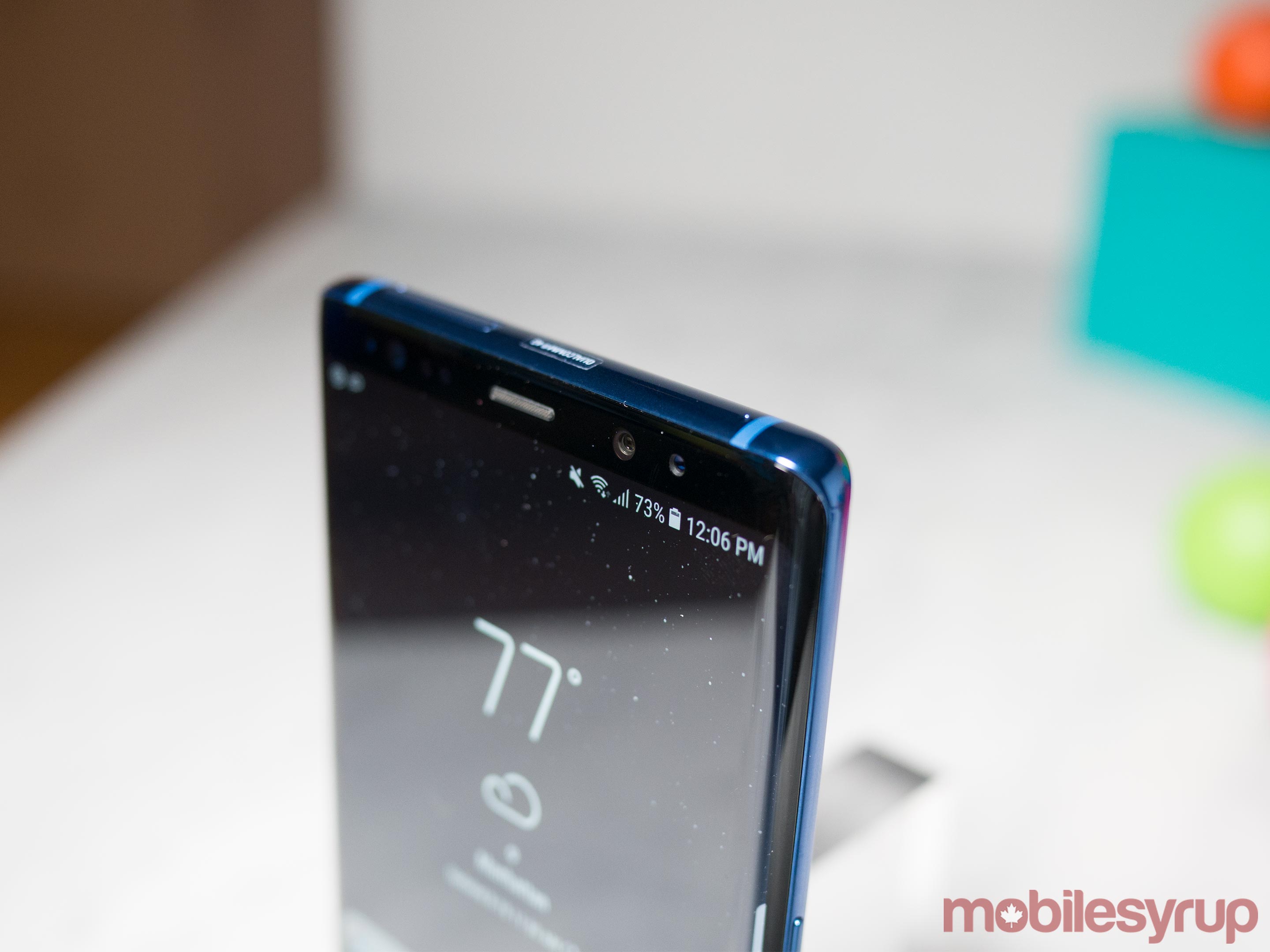
At this point, water resistance should be expected and standard on every high-end smartphone (I’m looking at you Essential Phone and the Pixel).
Lastly, the Note 8’s 3,300mAh battery comes in slightly smaller when compared to the Note 7’s 3,500mAh power source, likely in an effort to avoid the overheating issues the Note 7 suffered from (for reference, the Note 5’s battery is only 3,000mAh).
Same S Pen
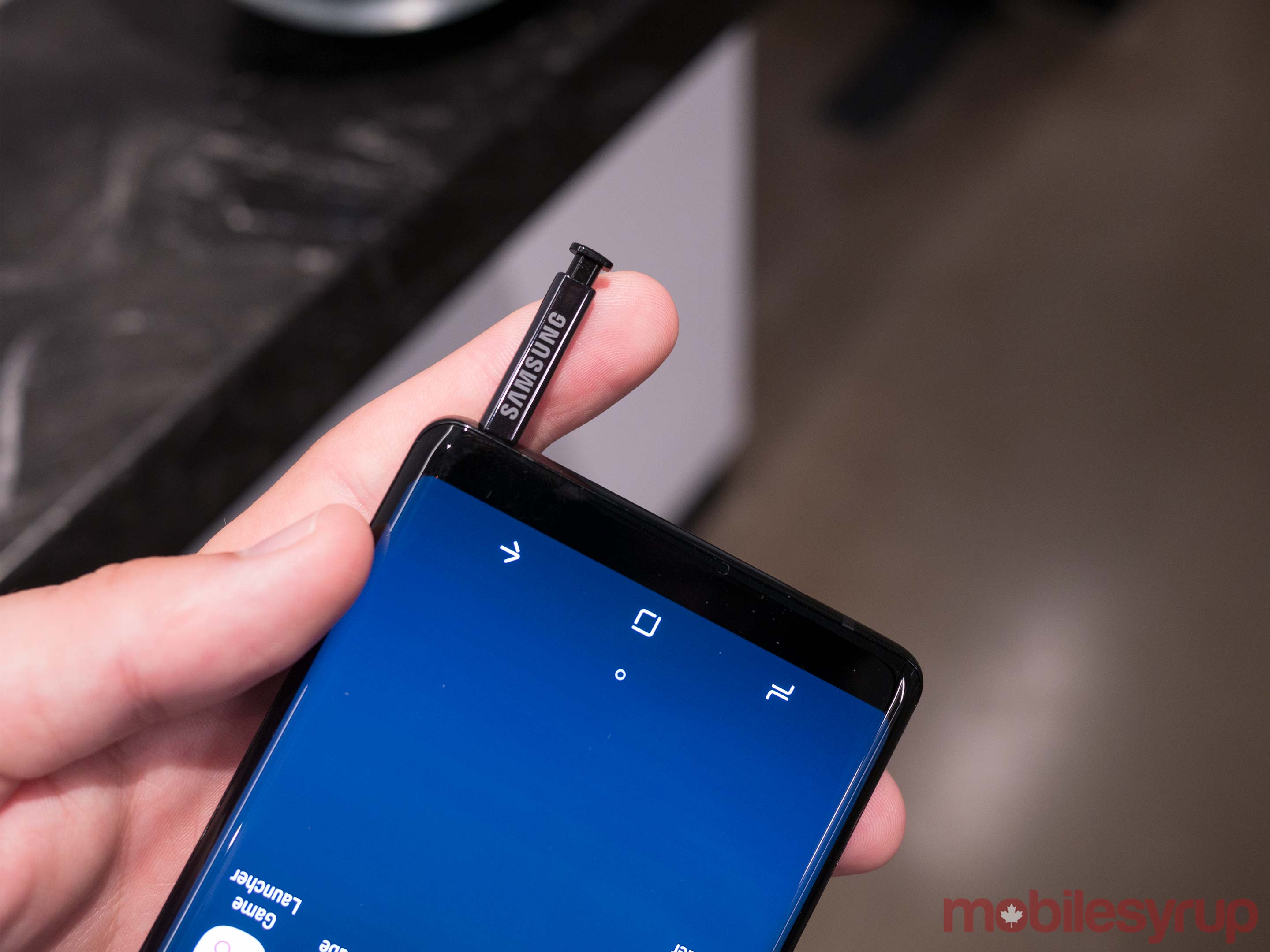
While I’ve never been a huge fan of Samsung’s S Pen, I know that many users purchase Note device specifically to have access to a stylus.
While Samsung is touting the Note 8’s S Pen functionality as an upgrade over the Note 7, that isn’t really the case. The company’s latest Note device is capable of processing 4,967 pressure points, the same number as the Note 7. The pen’s tip also measures in at the same as the Note 7’s, 0.7mm in diameter, 108mm in height and 5.8mm wide, complete with IP68 water resistance.
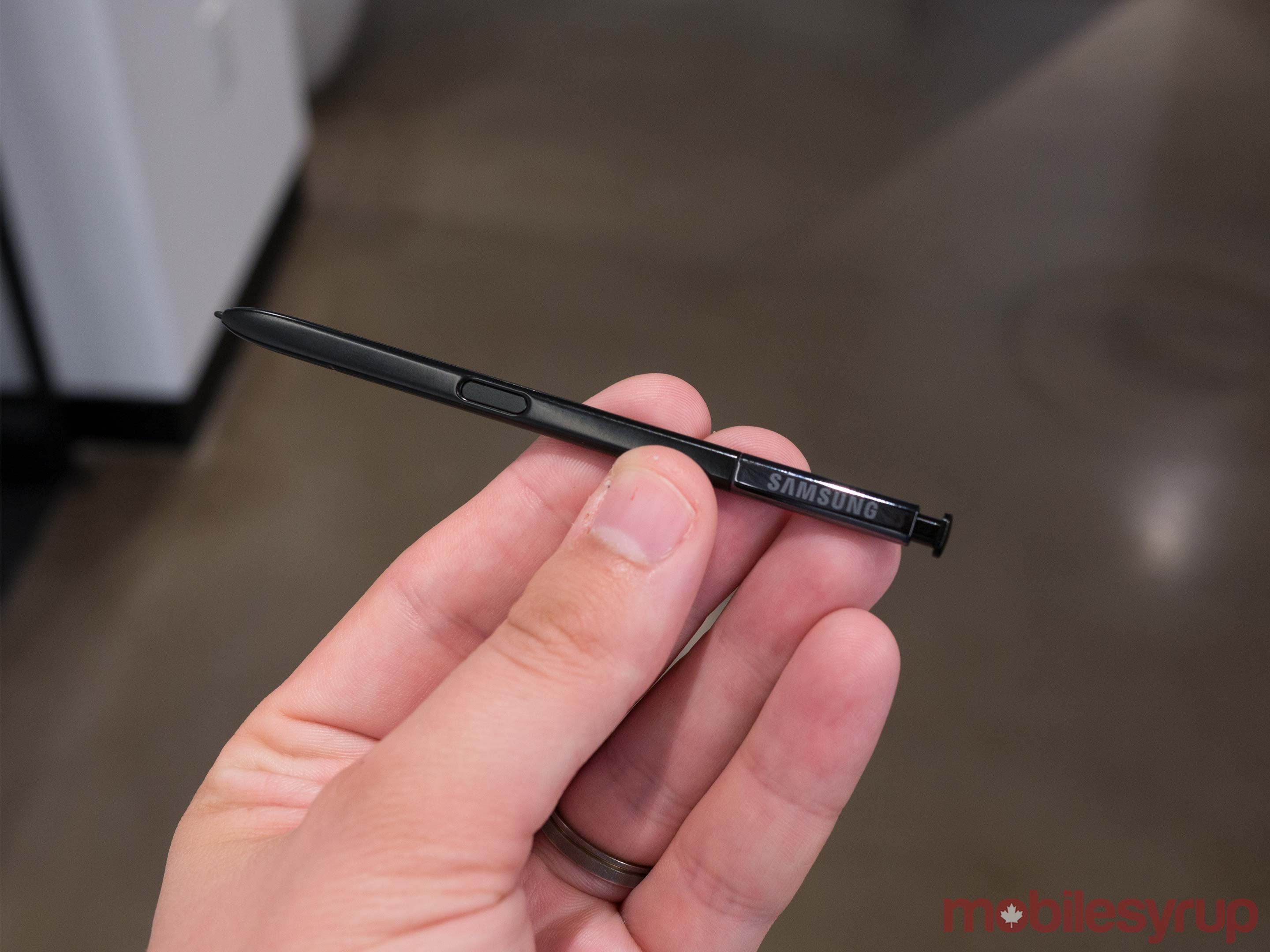
What this means, however, is that instead of an upgrade, the company just brought back the surprisingly accurate S Pen from the Note 7. While a superb experience, some sort of minor improvement would have been nice.
While testing out the phablet’s new ‘screen off’ memo feature, which allows users to write messages on the Note 8’s always-on display, the experience felt accurate and reminiscent of my time with the Note 7’s S Pen last year. Like many features I’ll be discussing in this hands-on, more testing is definitely necessary, however.
“Samsung says the Note 8’s “powerful camera” is an extension of the Galaxy S8’s low-light dual-pixel technology”
One new S Pen feature that stood out to me — I also expect it will be prominently featured in the inevitable Galaxy S9 — is something Samsung is calling ‘Live Message.’ The manufacturer says the feature allows users to write quick messages that can then be sent to friends through a variety of apps due to the fact that it utilizes the animated .agif file format, though I wasn’t able to test the feature myself.
Dual camera action
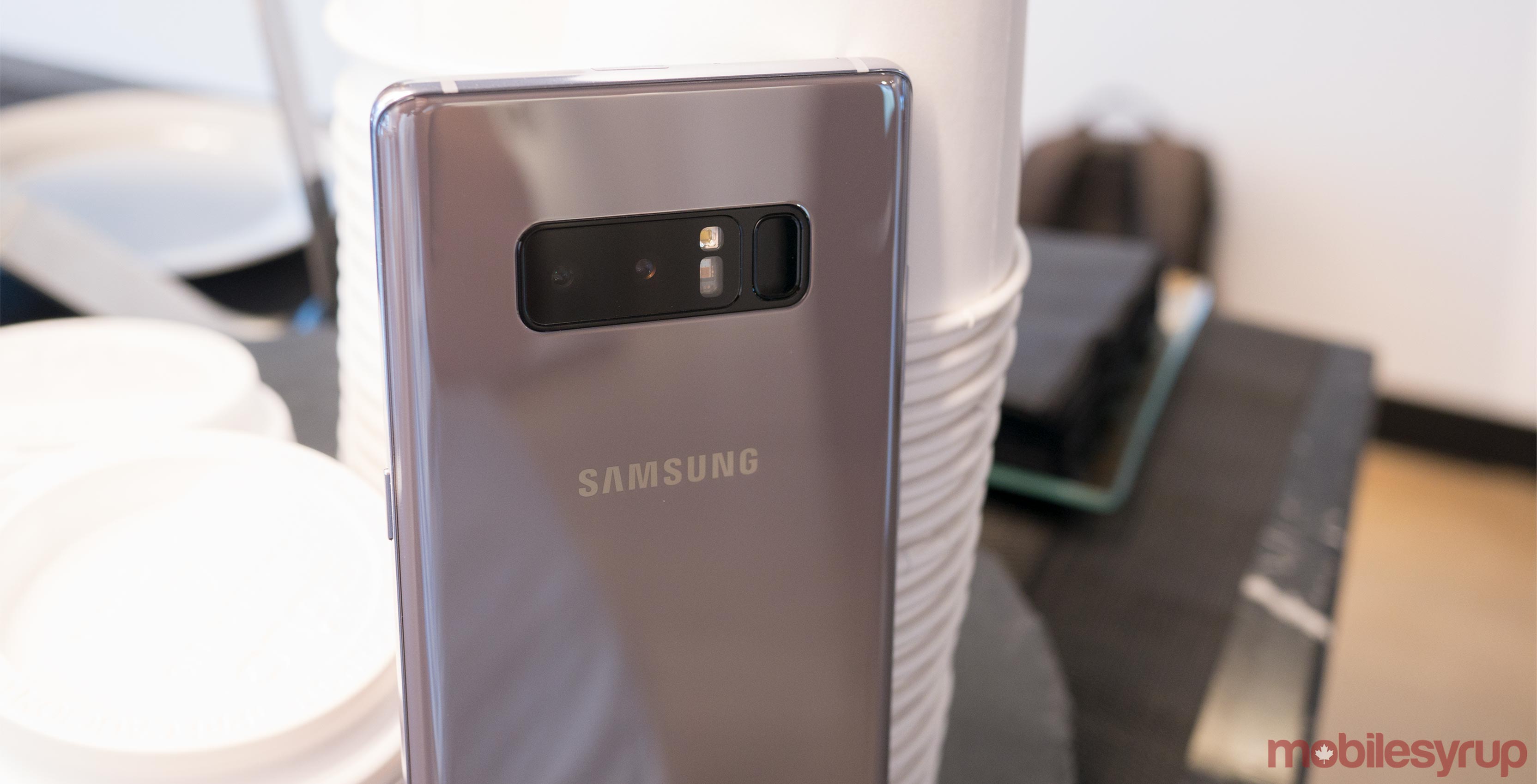
The aforementioned dual-lens camera in some ways signals a change in how Samsung intends to market the Note 8. As it stands right now, rather than position the phone as a productivity-focused smartphone, the South Korean manufacturer aims to go head-to-head with Apple in the somewhat plateaued high-end smartphone camera contest.
Samsung says the Note 8’s “powerful camera” is an extension of the Galaxy S8’s low-light dual-pixel technology. The phone features two shooters on its rear; a telephoto 12-megapixel f/2.4 lens and a wide-angle 12-megapixel f/1.7 camera, both with optical image stabilization, a move Samsung says is a first for the smartphone industry.
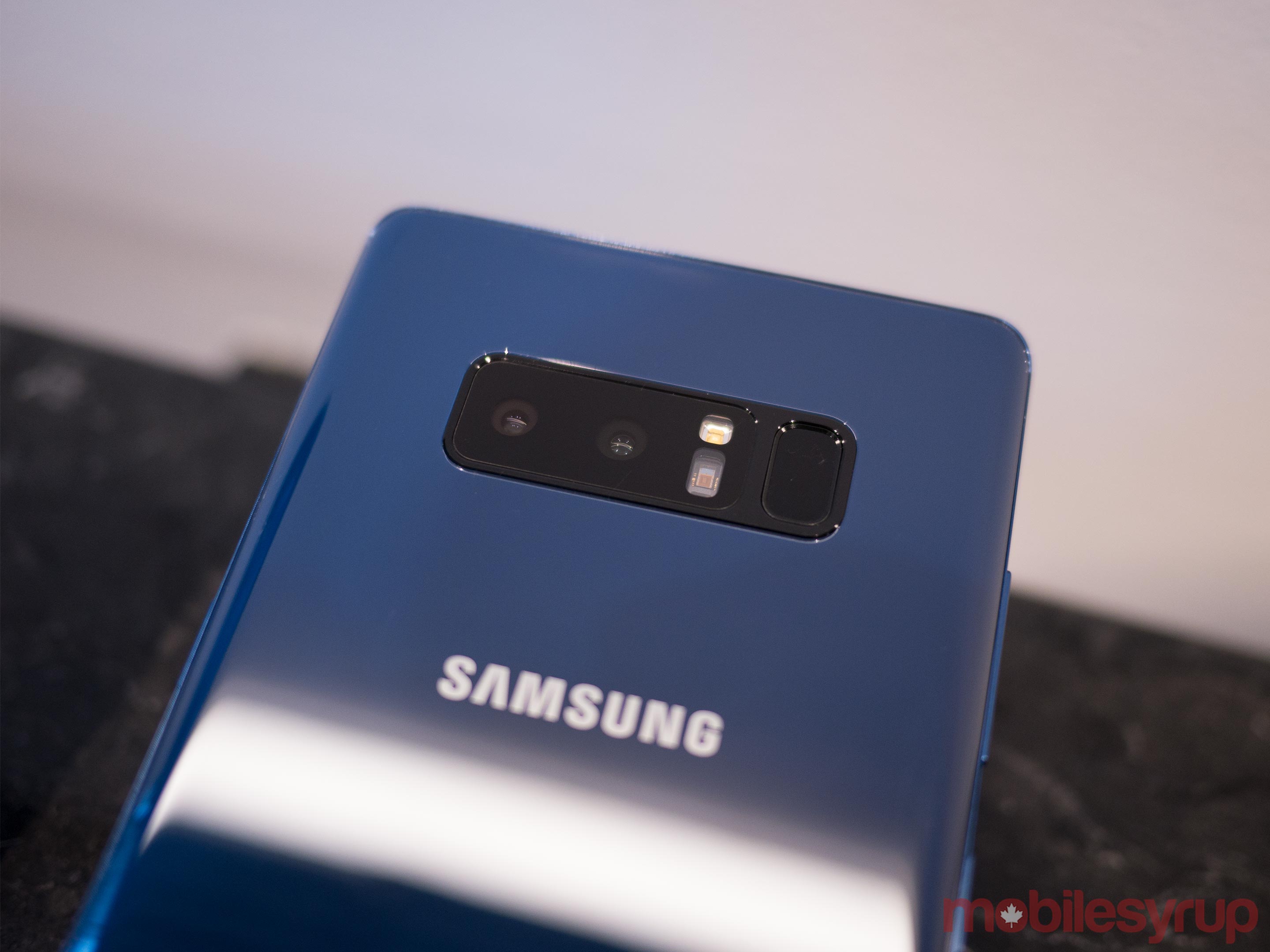
As it stands right now though, it’s unclear how far the Note 8’s camera is capable of zooming optically and whether it surpasses the iPhone 7 Plus and G6, the current reigning dual-camera champions.
While I didn’t test out the dual-camera’s image stabilization feature extensively, it certainly seemed to work well. A new feature called dual-capture, which utilizes both of the rear camera’s lenses, takes two photos at once. Samsung also showed off an iPhone-like bokeh mode dubbed ‘Live Focus,’ allowing users to dial up and down the amount of depth of field in a photograph, both like while taking the photo, as well as in post-production.
Take two
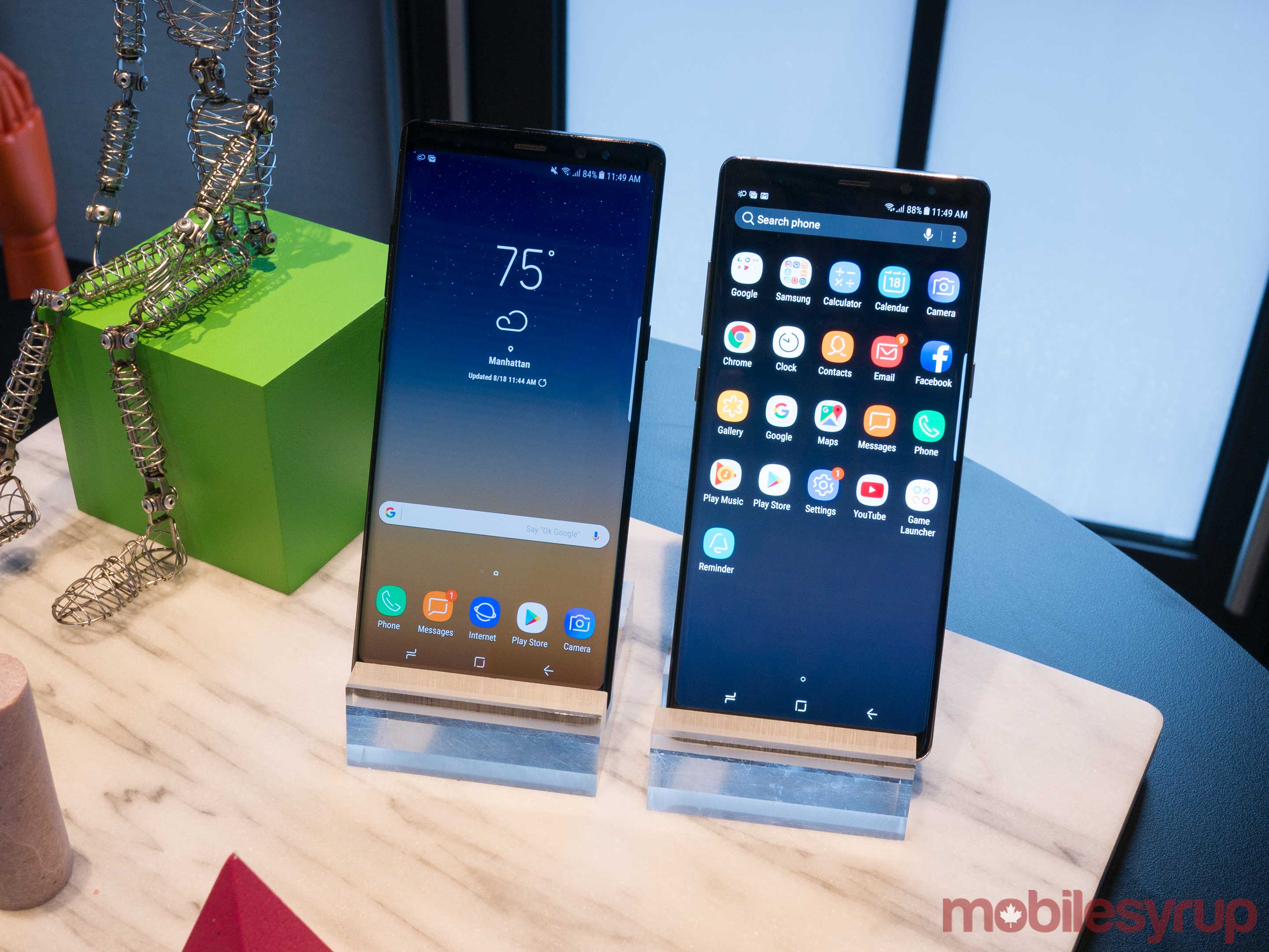
In many respects, the Note 8 is a second take on the dearly departed Note 7. That said, the device also shares one of the Galaxy S8 and S8+’s most significant issues.
While Samsung offers a variety of security methods for unlocking the Note 8, including iris scanning (first added to the Galaxy series with the Note 7), facial recognition and an awkwardly placed fingerprint sensor that sits beside the Note 8’s most exciting feature, the phone’s dual camera.
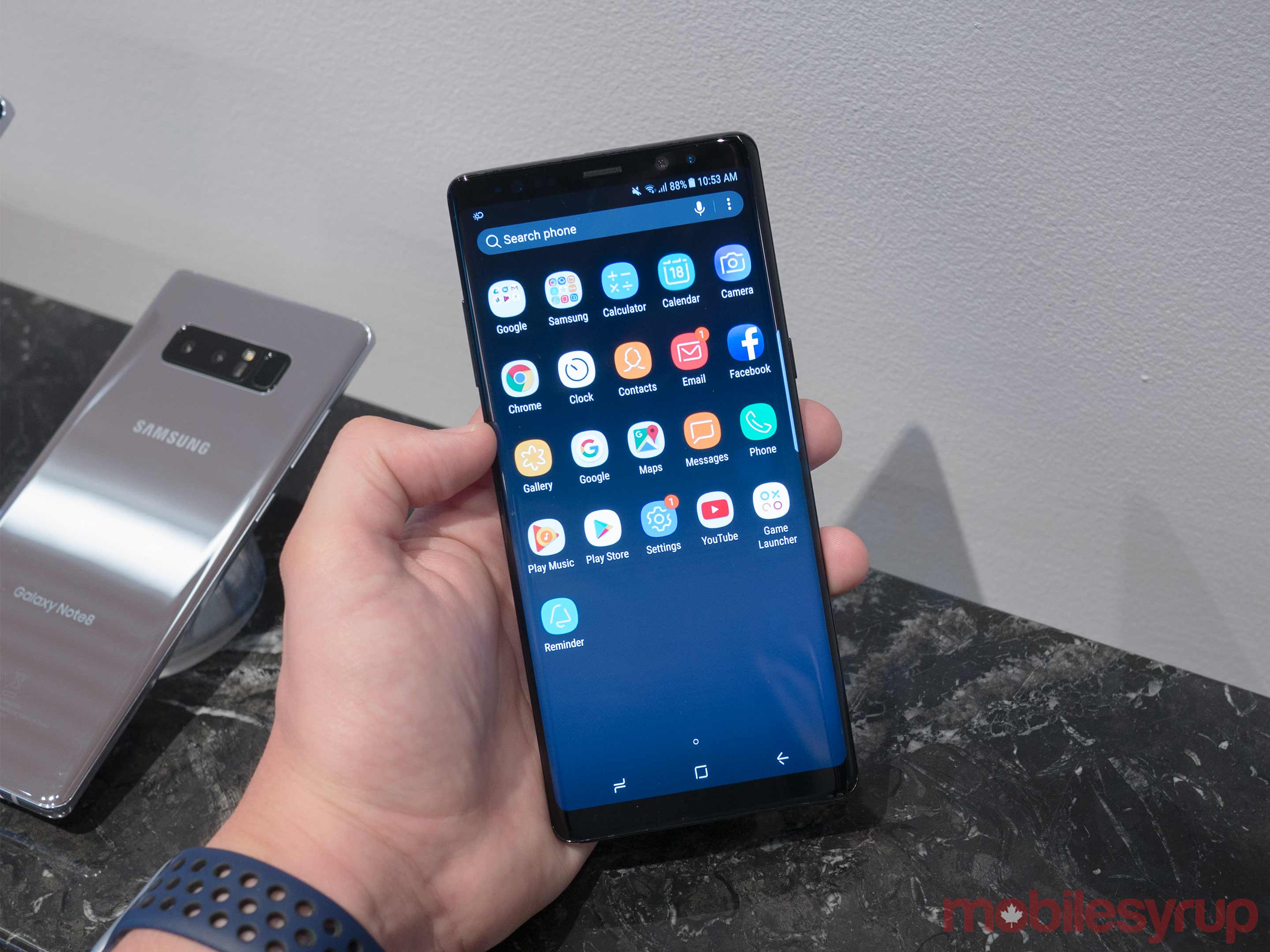
Clawing my finger across the S8 to reach the rear-facing fingerprint scanner was a difficult task that got even harder when I attempted it with the S8+. It comes as no surprise that despite how tall the Note 8’s 6.3-inch display is, it’s still exceedingly difficult to reach its fingerprint scanner. It seems that similar to the rumours surrounding Apple’s iPhone 8, Samsung also hasn’t been able to adequately embed the fingerprint scanner in the Note 8.
All in, the Note 8 is an impressive smartphone, though beyond its new dual-camera, a first for a Samsung smartphone, the phone’s resemblance to the Note 7 is striking and to some extent, a little disappointing.
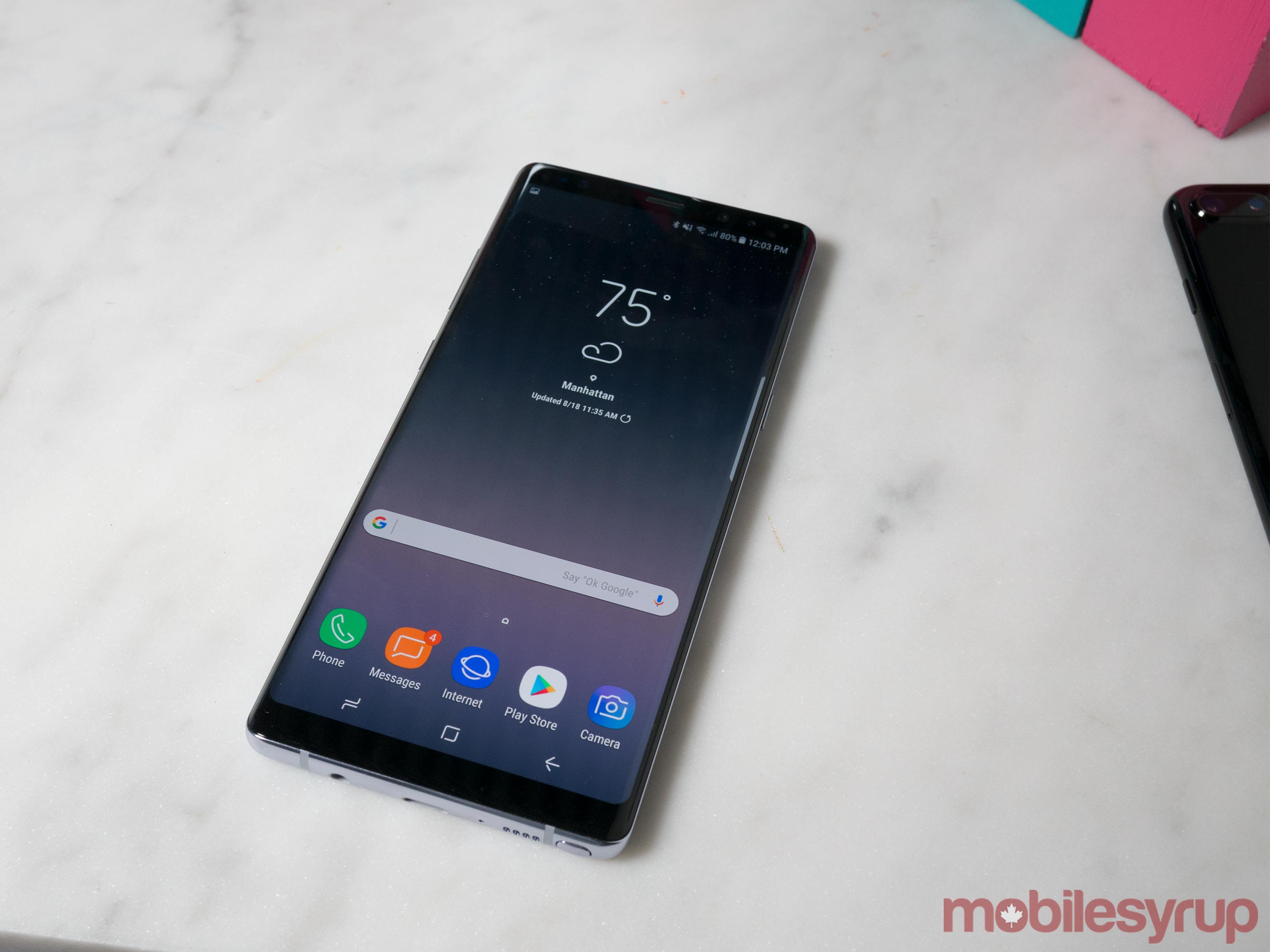
Samsung says the Note 8 is compatible with its DeX desktop dock, the Gear VR and it’s Bixby voice activated assistant platform.
Samsung Canada says the Note 8 will be available in ‘Midnight Black’ and ‘Deep Sea Blue’ in Canada, while the phone’s worldwide release includes ‘Maple Gold’ (this seems like a missed opportunity in the Canadian market) and the great looking ‘Orchid Grey.’
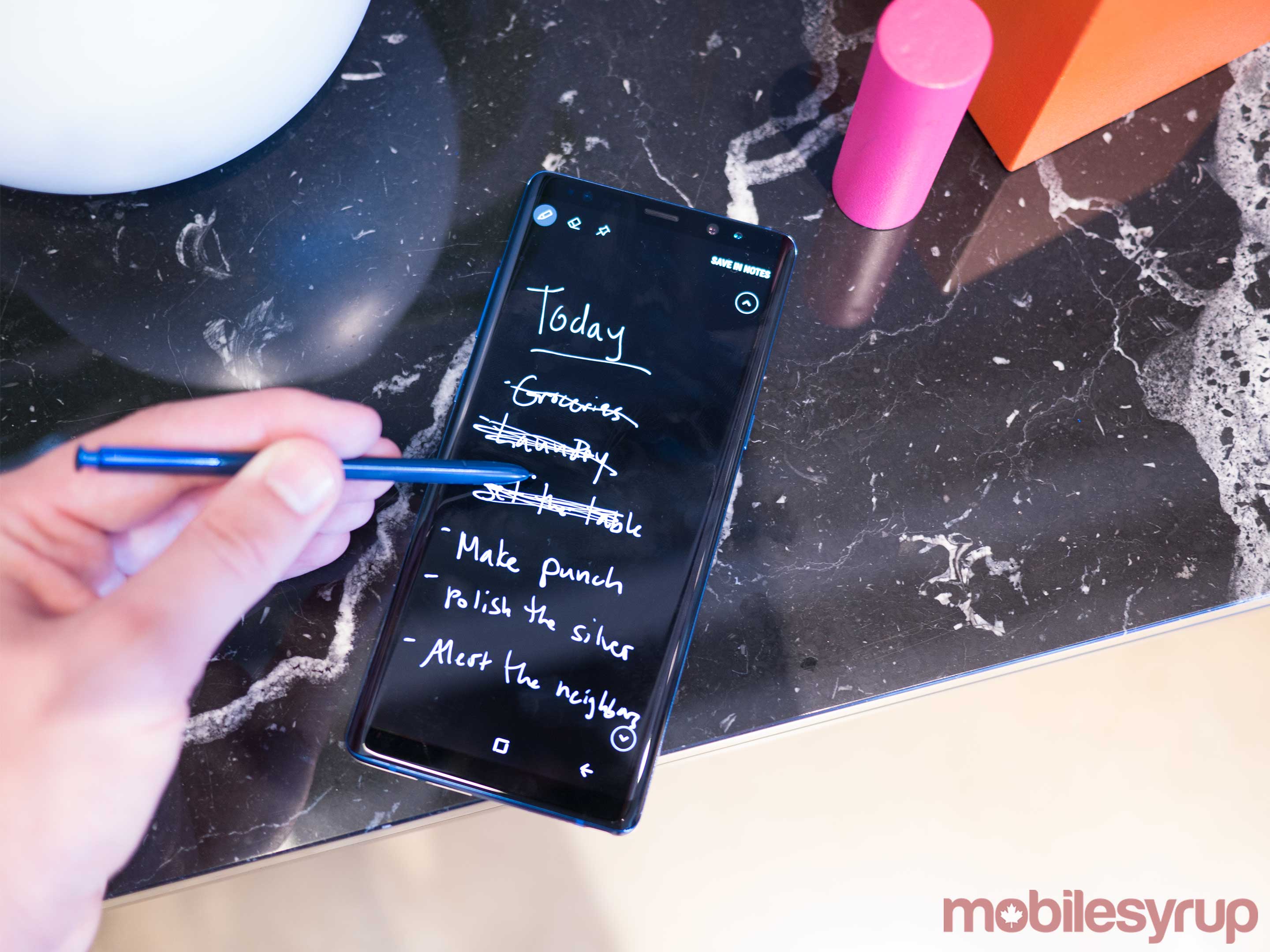
Pre-orders for the Note 8 are set to go live on August 23rd, with a full retail rollout on September 15th. Customers that pre-order between August 23rd and September 14th will receive a free 128GB Micro SD card and wireless charger, depending on what carrier they purchase the device from.
Carriers set to sell the Note 8 in Canada include Bell, Eastlink, Freedom, BellMTS, SaskTel, Telus, Rogers and Videotron. The phone will sell for $1,299 outright in Canada.
MobileSyrup may earn a commission from purchases made via our links, which helps fund the journalism we provide free on our website. These links do not influence our editorial content. Support us here.


